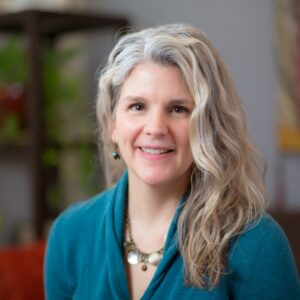I recently came across a book, The Joy of Burnout: How the End of the World Can be a New Beginning,by Dr. Dina Glouberman, that describes the gifts that come when we finally listen to ourselves and realize a change needs to happen. My first year of teaching at MSP has been the gift that came through a very difficult time.
It was a little over two years ago, I said to a friend: “I think I want to do more supervision.” I was struggling with feeling overwhelmed in my trauma-heavy clinical practice, supporting teenage/young adult children and aging parents, having a flair up of a chronic illness with new and scary symptoms, and could feel the tendrils of a depression reaching around my heart. The next week, my friend and colleague Dr. Heidi Martin, newly in her post as Clinical Director at MSP, called me out of the blue to ask if I was interested in supervising students. And just like that, a different path appeared.
In looking back now, I’d say a good portion of my adult life has been teeter-tottering between health and burnout.
I began working with trauma as an undergraduate, becoming one of the first students trained as a peer educator for the sexual assault prevention program on campus. And thus, I began a long career of working with human suffering. Although I am proud of this work, there is a parallel story of my own suffering, health challenges, and times of despair.
As a mental health provider, I was hesitant to share my story, as I felt that I should know how to handle pressures or be immune to the impact of the suffering and trauma I bear witness to, day-in and day-out. I had a sense that I was failing if I too was suffering.
Yet, I, like all mental health care providers, am not immune. As healthy human beings, our work with suffering must impact us, if we are to be effective. And the answer is not just good self-care, though that is important. In the book, Trauma Stewardship, Laura VanDernoot Lipsky outlines the importance of addressing the impact of trauma on the individual, organizational and societal level. This is my passion, and something I find a way to weave into every class I teach. Trauma stewardship is about retaining our humanity in the face of suffering, it is about acknowledging and healing our own suffering, it is about creating healthy spaces where we can heal in relationship.
I have loved teaching at MSP this past year for many reasons. I enjoyed the challenge of presenting material in ways that students of diverse backgrounds, interests, learning styles and abilities can engage, enjoy and learn. It was nourishing to connect regularly with smart, funny and passionate colleagues.
I have taught in different academic contexts and the students at MSP are a rare breed. They are willing not only to do the academic work with a high degree of excellence, but to be vulnerable and real in the quest to become a psychologist. I found deep satisfaction in watching students become more fully the people and professionals they wish to be. Most importantly, I loved the challenge of creating healthy spaces for students to do the work they need to become a healer.
I eagerly anticipate my second year of teaching at MSP, taking forward all that I have learned this year. I will continue to work to create healthy, safe spaces for students by endeavoring to walk the walk of being a humanist, a feminist and a psychologist. I feel more alive as I work to find ways to use my own humanness, my failures, my struggles and my successes to inspire and teach the next generation of people who will create the space for individuals, for organizations and for communities to find their path to healing.
 Johanna Soet Buzolits, PhD is a Core Faculty member at MSP.
Johanna Soet Buzolits, PhD is a Core Faculty member at MSP.